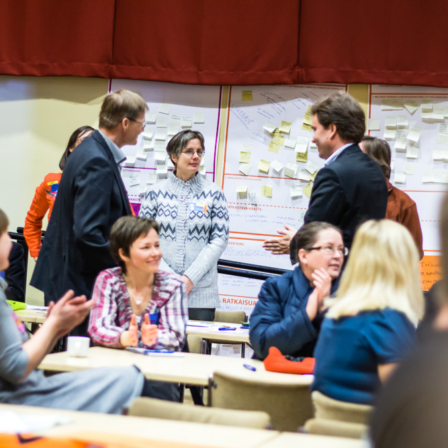The public sector would benefit from the use of experiments as strategic development tools, according to a recent study commissioned by Sitra. The results suggest there is a need for a bold, light and inexpensive culture of experimentation that can be used to complement our planning culture.
Could the Finnish proverb “well planned is half done” be changed to “tried and tested is well planned”? In some cases, yes. This might be the future path for a Finnish administrative culture based on careful planning, were we to welcome a new agile development method: strategic experimentation. Of course, proper planning – preparation based on working group reports, foresight and preparedness – will always be necessary, but it needs to be supplemented by more agile and flexible social development methods. Strategic experiments are the answer: they are a light, nimble and inexpensive way of solving problems and testing new approaches in a short period of time.
Sitra has embraced experimentation. In the Towards Resource Wisdom project in Jyväskylä, for example, experiments were used as a strategic development tool. In late 2013, Sitra harnessed experimentation techniques to search for new ways that could be embedded into everyday activities to reduce the consumption of natural resources and cut emissions while increasing well-being in the region; in other words, to promote resource wisdom. In the Jyväskylä region, residents produced more than 210 ideas. Of these ideas, 15 were developed further into practical experiments, and nearly all of them had the hoped-for ecological, financial and social impacts. The experiments were developed and fine-tuned along the way. In one of the experiments, aimed at reducing leftover food in schools, a new operating model was produced that has now been adopted elsewhere in Finland. The decision was made to continue five of the fifteen experiments in one form or another.
The Finnish culture of experimentation is still in its early stages and poses many challenges. In the Towards Resource Wisdom project, researchers from the Finnish Environment Institute, Annukka Berg, Mikael Hildén and Kirsi Lahti, studied various ways of using experiments as strategic development tools and the ways in which they could help achieve actual changes and wide-ranging effects.
The experiments carried out in Jyväskylä were successful in many ways: they provided a quick way to test the practical feasibility of new ideas, visualise the concept of resource wisdom, create an enthusiastic atmosphere and commit the city’s residents to the resource-wise project. For the City of Jyväskylä, the experiments were a new development tool. The experiments also highlighted the need for political decision-making, managerial commitment, new business and changes in the operations of the public sector, organisations and consumers in order to achieve permanent changes. The managerial staff of organisations and the city must play a role in the experiments, which must be embedded into more broad-based development processes and change strategies.
There are many ways to support experimentation, such as by providing the implementers with funds that are easy to apply for, expert advice and communication and facilitation support. Communications played a key role in the dissemination of the positive results of the experiments: even the most small-scale, everyday experiments received plenty of media coverage, raised a lot of discussion and attracted exceptionally positive attention.
Resource wisdom is aimed at solving global challenges: curbing climate change and rationalising the use of depleting natural resources while increasing well-being. One of the most important outcomes of the experiments was showing how we can tackle these huge challenges by making small changes to our everyday activities. The experiments provided people with a chance to improve their work and everyday life, and a unique opportunity to participate in the meaningful development of their own living environment. There is clearly a demand for this.
Sitra’s report “Towards a culture of experimentation” is downloadable in Finnish via this link Kohti kokeilukulttuuria.






Recommended